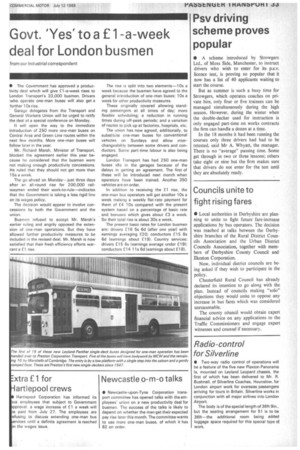Govt. 'Yes' to a £1 -a-week deal for London busmen
Page 35

If you've noticed an error in this article please click here to report it so we can fix it.
from our Industrial correspondent
• The Government has approved a productivity deal which will give £1-a-week rises to London Transport's 33,000 busmen. Drivers who operate one-man buses will also get a further lOs rise.
Garage delegates from the Transport and General Workers Union will be urged to ratify the deal at a special conference on Monday.
It will open the way to the immediate introduction of 250 more one-man buses on Central Area and Green Line routes within the next few months. More one-man buses will follow later in the year.
Mr. Richard Marsh, Minister of Transport, blocked the agreement earlier this year because he considered that the busmen were not making enough productivity concessions. He ruled that they should not get more than 15s a week.
The go-ahead on Monday---just three days after an all-round rise for 200,000 railwaymen ended their work-to-rule—indicates that the Government is taking a less rigid line on its wages policy.
The decision would appear to involve concessions by both the Government and the union.
Busmen refused to accept Mr. Marsh's earlier ruling and angrily opposed the extension of one-man operations. But they have allowed further productivity measures to be included in the revised deal. Mr. Marsh is now satisfied that their fresh efficiency efforts warrant a £1 rise. The rise is split into two elements-10s a week because the busmen have agreed to the general introduction of one-man buses: 10s a week for other productivity measures.
These originally covered allowing standing passengers at all times of day: more flexible scheduling; a reduction in running times during off-peak periods; and a variation of routes to pick up at factories, hospitals, etc.
The union has now agreed, additionally, to substitute one-man buses for conventional vehicles on Sundays and allow interchangeability between some drivers and conductors. Sonic part-time labour is also being engaged.
London Transport has had 260 one-man buses idle in the garages because of the delays in getting an agreement. The first of these will be introduced next month when operators have been trained. Another 350 vehicles are on order.
In addition to receiving the El rise, the one-man bus operators will get another 10s a week making a weekly flat-rate payment for them of £4 1 Os compared with the present system based on a percentage of basic rate and bonuses which gives about £3 a week. So their total rise is about 30s a week.
The present basic rates for London busmen are: drivers El 6 5s 6d (after one year) with earnings averaging £20; conductors £15 8s 6d (earnings about £1 9). Country services: drivers £15 6s (earnings average under £19); conductors El 4 11s 6d (earnings about f 1 81.












































































































